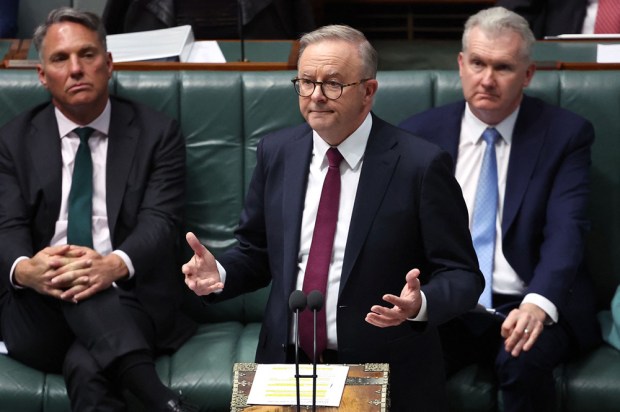Will the Liberal Party forgive Malcolm Turnbull for this election if Tony Abbott’s hard-won gains are lost for no good purpose? Even if he avoids defeat or a hung parliament, he is likely to lose several of his 90 MPs, emerge with less than the current 33 senators and be unable to pass, even at a joint sitting, the very bills which triggered the double dissolution. Electing six senators in a double dissolution requires 46.2 per cent of the vote compared with only 42.9 per cent to elect three in a normal election. Unless it is very popular, a government is therefore better advised to serve a full term. No wonder Labor didn’t even contemplate blocking supply for this election. Nervous Coalition politicians are no doubt wondering why Turnbull called it. Was it just to counter the growing impression that he is indecisive?
Some say that he should have called the election soon after he knifed Abbott. This is on the basis of those early euphoric opinion polls, such as the November Fairfax-Ipsos poll which found the government enjoyed a 57:43 two party preferred vote. These probably only reflected the obvious − the left much prefer Turnbull to Abbott as Liberal leader. After all, Turnbull’s default position on most matters has long been to the left, although he now claims all the Abbott government’s achievements as his own. But most on the left would never vote Liberal.
This is supported by the only election Turnbull has so far faced as PM. That was in the December North Sydney by-election where the Liberals campaigned as if he were the candidate. Instead of a landslide, there was an almost 13 per cent swing against him. This was downplayed by a stunned commentariat. Imagine their reaction if this had happened to Abbott.
Calling a double dissolution election now is likely to be seen as a major error of judgement. Opportunist politicians will be asking whether it was worth the treachery and betrayal of knifing Abbott.
They had swallowed Turnbull’s line that he would provide a magisterial economic narrative so authoritative and so commanding that the nation would instantly recognise this. The consequence would be that the Coalition would be locked into a commanding position in the polls down to the election.
Instead we have seen hesitation and indecision on fundamental policy reform, inadequate attention to protecting and watering our prime agricultural land, the continual provocation of conservative Australia, the takeover of the party by the hard left lobbyist faction and, to keep Christopher Pyne and others in their seats, the acquisition of a ridiculously expensive and technologically outdated submarine fleet so delayed it won’t be complete even for the centenary of VJ day in 2045.
Worse, like a thief in the night, Turnbull chose the election budget to raid the superannuation funds of those who had scraped and saved over a lifetime, capping them to provide no more than half or even a third of the post-tax superannuation of many a politician, some of whom retire in their forties and have since been exposed as double dipping on their negatively geared property investments.
In wanting to be seen as harder than Labor on self-funded retirees, Turnbull did precisely what Treasurer Morrison −a mere three months before − had warned would be the undesirable consequence, the undermining of confidence in superannuation.
The extraordinary fact is that those targeted by Turnbull are none other than Menzies ‘forgotten people’ − small business people, professionals, tradesmen and women, farmers, self-funded retirees and all those others who plan not to be a burden on the diminishing band of net taxpayers in the country. In other words, the Coalition’s heartland. If Turnbull would do this, through measures his own Treasurer had previously condemned as ‘effectively retrospective’, without notice, without discussion or consultation and without even considering what two ministers subsequently conceded were its unintended consequences’, the ‘forgotten people’ are now asking themselves how they can have confidence not only in the superannuation system, but in any government led by Malcolm Turnbull?
Apart from the glacial widening of Abbott’s small business tax concession, this conclusion is supported by any realistic assessment of the other budgetary provisions. These include a failure to revoke the backpacker tax which discriminates against foreign workers by seizing almost one third of every dollar they earn. Crucial to the tourist industry and to farming, backpackers collect the harvest and do other work which our work-resistant, healthy unemployed refuse to do. Because it will only drive the backpackers away, it will raise next to nothing. Instead of delaying it, it should be withdrawn before the government becomes a laughing stock.
Rather than insisting on the healthy unemployed taking work performed mainly by backpackers, the Turnbull government decided on yet another ‘innovative’ and expensive scheme to mollycoddle and cajole the work-resistant into actually doing some work for the dole. The solution is obvious. Just don’t pay them.
Not content with stealing Labor’s idea of raiding peoples’ superannuation funds, the government copied Labor with a massive increase to the tobacco excise. This will weigh heaviest on poorer smokers and will be a powerful incentive to smugglers who are already very active.
They also ignored the iron rule that as more federal money is thrown at education, standards fall further. And abandoning the reality imposed by Abbott and consistent with Turnbull’s allegiance to the ‘church of climatology’, the government continues to provide vast, pointless subsidies for solar power and foreign owned wind farms, despite their impact on the health of those who live nearby.
Above all the government has made no serious attempt to rein in its appalling out-of-control expenditure, just offering the usual fairy tales about some surplus emerging in the distant future. Most government activities include significant and at times massive waste; that is in the nature of government and why it is always preferable to hand as many functions as possible to the private sector, provided that competition prevails there − just think of the NBN over which Turnbull so long presided. No wonder so many traditional Liberal voters are torn between just returning the government in the House and those who have formed the considered opinion that the only way the party can be reformed is if they are defeated.
Absent a win ensuring the DD legislation can be passed, there will be no honourable alternative for Turnbull and his merry band of plotters but to resign.
Got something to add? Join the discussion and comment below.
Get 10 issues for just $10
Subscribe to The Spectator Australia today for the next 10 magazine issues, plus full online access, for just $10.
You might disagree with half of it, but you’ll enjoy reading all of it. Try your first month for free, then just $2 a week for the remainder of your first year.













Comments
Don't miss out
Join the conversation with other Spectator Australia readers. Subscribe to leave a comment.
SUBSCRIBEAlready a subscriber? Log in